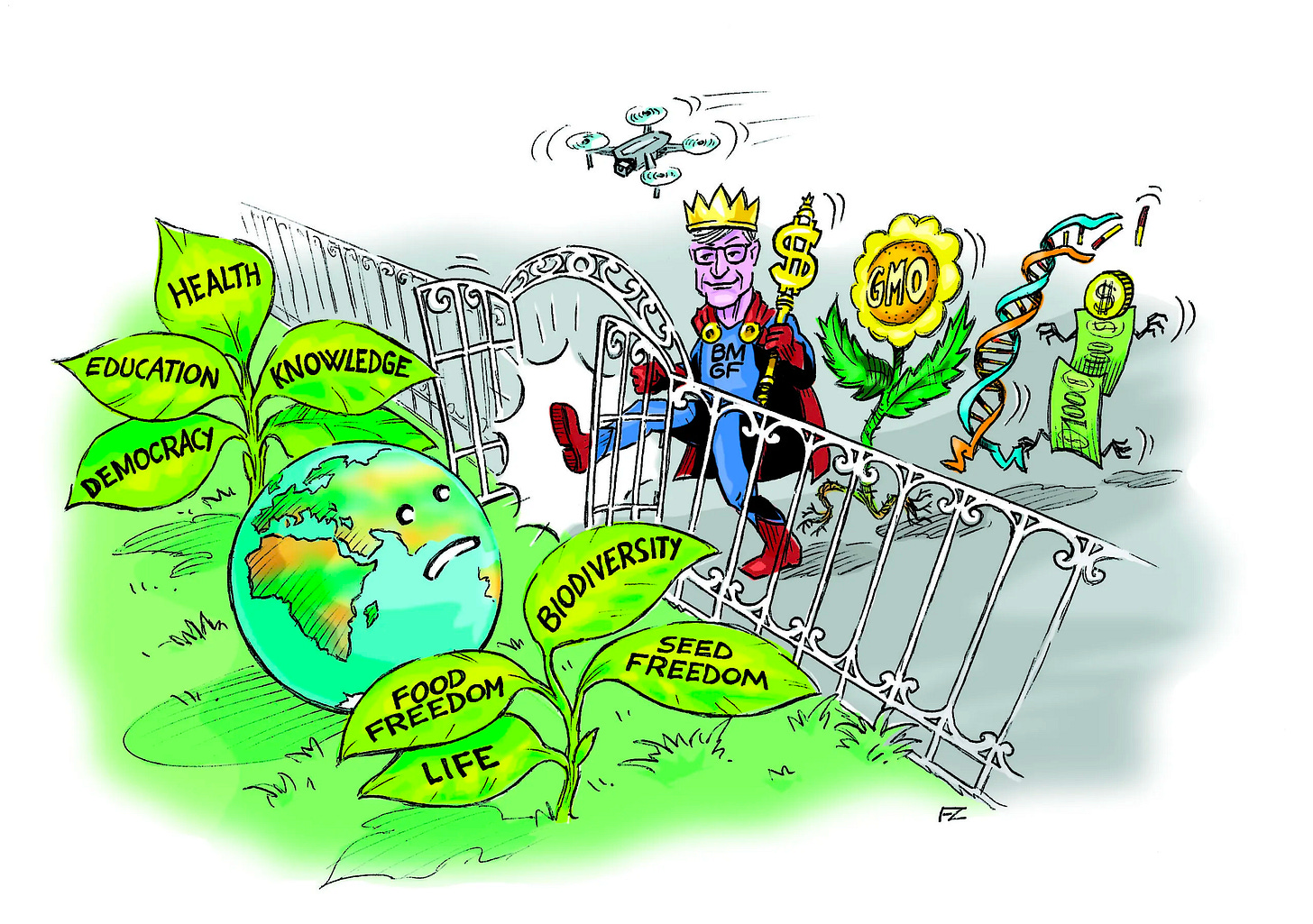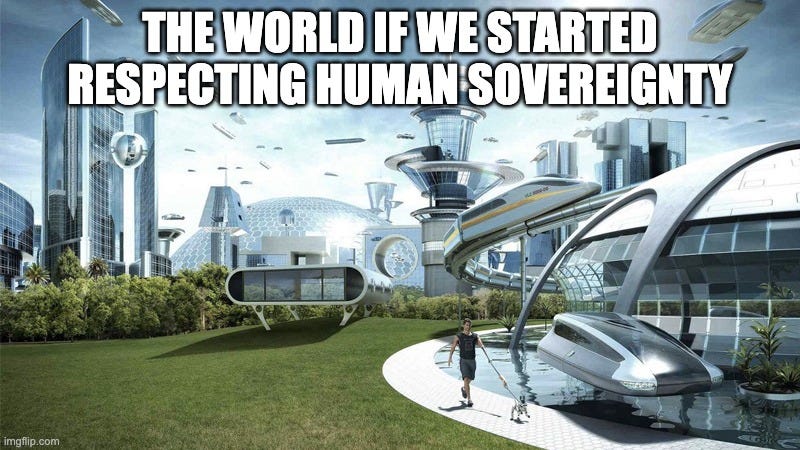Why You Should Become A “Sovereigntist”
A Golden Age for humanity depends on the emergence of millions of leaders around the world who genuinely prioritize individual, community, and national sovereignty
In today's rapidly evolving world, the pressing need for a new breed of leadership has never been clearer. Traditional labels like "capitalist," "socialist," “liberal,” “conservative,” "nationalist," and "globalist" often obstruct productive discussions about accelerating human flourishing, ensnaring people in unproductive debates that go nowhere.
It's high time we shift our focus towards a fresh and more effective approach.
This blog post introduces the concept of the "sovereigntist leader": a forward-thinking, visionary individual who embodies and advocates for the principles of "sovereigntism"—emphasizing human flourishing and sovereignty at every sized “holon” of human civilization.
By highlighting the key principles that characterize sovereigntist leaders, I aim to inspire the next generation of leaders to embrace sovereigntism, ultimately paving the way for a Golden Age of humanity.
In this piece, I dive into what should soon become a sovereigntist movement and its role in distinguishing authentic advocates for human flourishing.
Together, let’s explore the indispensability of 𝘂𝗻𝗶𝘃𝗲𝗿𝘀𝗮𝗹 𝘀𝗼𝘃𝗲𝗿𝗲𝗶𝗴𝗻𝘁𝘆 as a cornerstone virtue for the 21st century and beyond—especially as the forces of universal control feel increasingly emboldened.
The Sovereigntist Leader: Defining and Encouraging a New Breed of Leadership
Sovereigntist leaders are those who embody and champion the principles of sovereigntism in their governance, regardless of their country's political system.
These leaders prioritize human flourishing and sovereignty at every scale, ultimately working to accelerate human flourishing for all.
In order to foster sovereigntist leadership, we must first define the qualities and values that make up a sovereigntist leader. By doing so, we can encourage current and future leaders to embrace sovereigntism and work towards a brighter future for all.
Seven Key Principles for Sovereigntist Leaders
Holonic sovereignty: First and foremost, sovereigntist leaders must value the autonomy and self-determination of every holon of human civilization—whether individuals, families, communities, nations, or other collectives; and they must create and support governance structures that respect and uphold sovereignty for all stakeholders. Leaders who believe in holonic sovereignty believe that each holon has the power to govern itself and make decisions, and at the same time be governed with consent by larger holons.
Human flourishing: Prioritize the well-being, happiness, and fulfillment of all people, implementing policies and practices that empower individuals to develop their potential and contribute to their communities.
Open-mindedness and adaptability: Recognize that there is no one-size-fits-all solution to governance and be willing to experiment with and adapt to different governance models in diverse contexts and environments.
Collaborative global engagement: Advocate for international cooperation and dialogue to address shared challenges and opportunities, promoting global peace, stability, and prosperity while respecting the sovereignty of individual nations.
Environmental stewardship: Support policies and practices that promote sustainable development and responsible use of natural resources, acknowledging the importance of preserving our shared ecological commons.
Democratic values: Uphold democratic principles and values, such as transparency, accountability, and the rule of law, creating governance structures that empower citizens and protect their rights and freedoms.
Flexibility in citizenship and migration: Emphasize the opportunity for individuals to immigrate to nation-states that better support their sovereignty if their current nation-state does not support their sovereignty.
Sovereigntist leaders who adhere to these principles offer a more flexible and adaptable approach to governance for the nation-states of the future.
By embracing sovereigntism, these leaders can address the shortcomings of traditional nation-states and work better together to accelerate human flourishing for all.
Vitalik Buterin as a Case Study of an Effective Sovereigntist Leader
A near-perfect example of a sovereigntist is Vitalik Buterin, co-founder of Ethereum.
Vitalik is the opposite of an extractive, coercive leader. His direction of Ethereum is through soft power and community building and empowering other sovereigntist leaders, like Ethereum Foundation Executive Director Aya Miyaguchi, who preaches the importance of respected leaders and institutions doing LESS not MORE through the principle of “SUBTRACTION.”
Let’s get more specific with how Vitalik models sovereigntist leadership:
Vitalik demonstrates an appreciation for holonic sovereignty through Ethereum's decentralized design, which empowers individuals and communities.
His advocacy for decentralized science and public goods in general reflects his commitment to human flourishing.
His work on Ethereum 2.0 has demonstrated his openness and adaptability.
His advocacy for international cooperation within the blockchain community shows his interest in collaborative global engagement.
His transition of Ethereum to a greener consensus mechanism shows his concern for the environment.
His support for DAOs shows his support for democratic values.
And his sponsorship of network state experiments shows a commitment to supporting flexibility in citizenship and migration.
Vitalik is a great reminder that a sovereignist style of leadership can be extremely effective at a time when people are yearning for alternatives to the command and control structures so dominant in today's world.
What Happens As Leaders Adopt The Identity Label: “Sovereigntist”
Ideas have the power to shape identities and inspire change.
By popularizing "sovereigntism" and defining the sovereigntist leader, we can cultivate a new political identity, motivating leaders to champion sovereignty across all levels of human civilization.
As sovereigntism gains recognition, individuals, including politicians and policymakers, may adopt this identity, impacting their decision-making processes. This popularization creates a feedback loop, encouraging accountability among leaders and empowering citizens to hold them responsible for upholding sovereignty.
Moreover, sovereigntism fosters global solidarity, transcending borders and promoting shared values of human flourishing and sovereignty.
This collective identity of “sovereigntist” paves the way for a global network of individuals dedicated to advancing sovereigntism, ultimately leading to improved governance and a better world for all.

Sovereigntism: A Path to Genuine Human Flourishing and a Timely Alternative to the World Economic Forum Philosophy
While many individuals and organizations aim to achieve human flourishing, their approaches can vary widely, sometimes exacerbating power imbalances and eroding sovereignty, especially for marginalized communities. Sovereigntism, as a political philosophy, differentiates true advocates for human flourishing, who recognize that flourishing is only possible when individuals, communities, and nations have autonomy and self-determination.
Certain tech billionaires, often disparaged as “evil globalists,” may try to foster human flourishing by providing basic needs, but their methods can be problematic if they undermine community sovereignty.
By excessively controlling and influencing these provisions, they might inadvertently perpetuate power imbalances and diminish sovereignty. Thus, sovereigntism is essential in distinguishing genuine advocates for human flourishing from well-intentioned yet ultimately sovereignty-undermining actors.
Bill Gates is frequently named as someone who—intentionally or not—undermines people’s sovereignty.
Indian scholar and environmental activist Vandana Shiva once said about Gates:
"While Gates' philanthropy may be well-intentioned, it has raised concerns about the erosion of national sovereignty and the potential for a single individual to shape global health agendas."
Beyond challenging the approach of individuals like Gates, sovereigntism also serves as a challenge and foil to the philosophy of organizations like the World Economic Forum (WEF), which tend to prioritize global governance and tacitly support the erosion of national sovereignty.
By focusing on the importance of sovereignty and self-determination, sovereigntism offers an alternative approach to governance that prioritizes the unique needs and cultures of diverse communities over the technocratic control systems aiming to “manage” the world.
Globalism, as advocated by organizations like the WEF, seeks to dissolve the structures of nation-states, such as the nuclear family, democracy, and border control, in favor of global governance by unelected non-governmental organizations (NGOs). While some NGOs create a positive impact, there are well-documented cases of abuse, such as:
Certain “open border” policies that inadvertently incentivize human suffering, including dangerous human caravans, human trafficking, and even concentration camps.
Policymakers imposing governance structures incompatible with local needs and culture, leading to instability and chaos.
Sovereigntism emphasizes self-determination as a guiding principle, encouraging support for national governance structures tailored to the specific needs and values of each population.
This isn’t politically correct to say, but democracy may be ideal for the USA, but might not be ideal for Afghanistan or Iraq, where it may breed chaos.
Overall, sovereigntism provides a valuable alternative to the globalist philosophy of organizations like the World Economic Forum. By championing sovereignty, self-determination, and the unique needs of diverse communities, sovereigntism paves the way for more effective governance and human flourishing.

Top Five Signs Someone Is NOT A Sovereigntist Leader
In my mind there are five signs that reveal that someone is not committed to the philosophy of sovereigntism:
They impose beliefs and values on others: A non-sovereigntist leader may disregard others' perspectives and try to force their own beliefs onto them, rather than respecting and valuing diverse opinions.
They undermine local decision-making: Such leaders may interfere with or manipulate local decision-making processes to advance their own or external interests, instead of empowering communities to make their own choices.
They exploit resources and communities: Non-sovereigntist leaders might extract resources or exploit communities for personal gain without considering the long-term consequences for the affected people or the environment.
They promote dependency: They may create or perpetuate situations where individuals, communities, or nations become reliant on external support, stifling their ability to develop self-sufficiency and autonomy.
They disrespect cultural diversity: These leaders may ignore or dismiss the unique cultural practices and values of different groups, promoting a homogeneous global culture rather than embracing diversity.
By recognizing these signs, it becomes easier to identify non-sovereigntist leaders and better understand the qualities that genuine sovereigntist leaders should embody.
A Vision for a Universally Sovereign Humanity
A future where humans are universally sovereign? This is a future worth fighting for:
Imagine a future where individuals, communities, and nations enjoy unparalleled sovereignty, allowing human flourishing to thrive beyond rigid ideologies and outdated governance. In this world, sovereigntist leadership empowers people to pursue success and happiness on their own terms.
Individuals gain more autonomy, making choices about education, careers, and personal relationships without external interference. They explore their passions, develop skills, and contribute to communities in meaningful ways.
Communities reclaim power, enjoying increased self-determination. Local decision-making processes adapt to unique needs and values, fostering ownership, pride, and resilience among members.
Nations, embracing sovereigntist principles, respect each other's autonomy and collaborate to address global challenges. This collaboration fosters global stability and progress, enabling nations to learn from one another.
The environment benefits from sovereigntism as communities and nations prioritize sustainability and stewardship. Responsible use of natural resources and protection of the planet become widespread, ensuring a thriving home for all.
In this future, sovereigntism transcends borders, fostering global solidarity where individuals, communities, and nations work together to create a world that celebrates human flourishing, autonomy, and self-determination.
Imagine a future where individuals, communities, and nations enjoy unprecedented levels of sovereignty, a world in which human flourishing is no longer stifled by rigid political ideologies or limited by outdated governance structures. In this vision of the future, the sovereigntist approach to leadership has taken hold, empowering people to chart their own paths toward success and happiness.
This future is possible. It’s up to sovereigntist leaders to make it a reality.
Conclusion: Sovereigntist Leaders Will Pave the Way for a Golden Age
Sovereigntist leaders like Vitalik Buterin hold the key to a Golden Age for humanity by championing the principles of sovereigntism, focusing on human flourishing and sovereignty across all levels.
By embracing these principles, these leaders can address the shortcomings of traditional nation-states and offer a more effective and adaptable approach to governance.
Sovereigntism serves as an alternative to the globalist philosophies of organizations, prioritizing the unique needs and cultures of diverse communities.
As sovereigntism gains recognition and popularity, it is vital to foster a global network of individuals dedicated to advancing sovereigntist ideals, ultimately leading to improved governance and a better world for all.
Do you identify as a sovereigntist? Why or why not? Feel free to leave your comments and thoughts below.







FANTASTIC piece Gary. It provides a great checklist and roadmap for nations to allow individuals and communities to flourish by understanding that less is more and that there are tons of unique needs that cannot be helped with broad stroke decision making. And although you don’t specifically state it, you inadvertently make points against billionaire worshipping, cultural homogenization, religious authoritarianism and welfare to work.
Well articulated thesis Gary. As a non-libertarian expert it’d be gd to understand the key ways sovereigntism differs from that ? Do we have any other gd examples of leaders other than Vitalik?